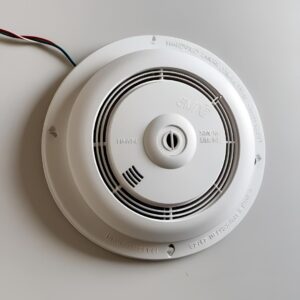Wired smoke detectors are crucial for protecting your home and family from possible fire dangers. But do hard-wired smoke detectors go bad, and what happens when these essential devices stop working as they should?
Similar to other elements in your house, hard-wired smoke detectors have a limited lifespan. Grasping their longevity, identifying failure indicators, and being aware of when to fix or substitute them is crucial for ensuring a secure habitat. This article will investigate if hard-wired smoke detectors can malfunction, the signs to be aware of, typical problems, and helpful troubleshooting or replacement advice to maintain your alarm system in excellent condition.

Do Hard-Wired Smoke Detectors Go Bad
The Lifespan of Hard-Wired Smoke Detectors
Indeed, hard-wired smoke detectors have a duration of effectiveness. Generally, these devices are designed to operate efficiently for 8-10 years. After this stage, their parts may start to deteriorate, leading to decreased smoke sensitivity or possibly total malfunction.
Why replacement matters:
A faulty smoke detector puts your home at risk of unnoticed fires. Consistently changing these devices makes certain that they remain dependable and can quickly identify dangers.
Why They Can Malfunction Over Time
Several factors contribute to hard-wired smoke detectors going bad, including:
- Wear and Tear: Just as household appliances age, so do smoke detectors. Constant use and environmental exposure take their toll.
- Dust and Debris: Accumulated particles can hinder smoke from entering or cause sensors to misread situations, potentially leading to false alarms or none whatsoever.
- Outdated Technology: Older equipment does not possess the enhanced features and efficiency of modern models.
- Power Surges: Voltage fluctuations can damage internal components over time.
Signs Your Hard-Wired Smoke Detector May Be Going Bad
Being proactive is key to ensuring your smoke detectors function properly. Watch out for these signs of malfunction:
Frequent Chirping or Beeping
Is your detector making those persistent chirping sounds? It’s more than just annoying; it’s your detector signaling a problem.
- Low Battery Warning: A quick fix that requires simply replacing the backup battery.
- System Malfunction: If new batteries don’t resolve the issue, the detector might have internal problems.
No Response During Tests
Hard-wired detectors come with a test button. If pressing it produces no response, your unit may have lost its ability to function. This could signal anything from wiring issues to a complete sensor failure.
False or Erratic Alarms
If your alarm goes off without any smoke or fire present, possible causes might include:
- Cooking vapors or steam tricking the sensor.
- A failing sensor unable to differentiate real threats from everyday activities.
- Electrical malfunctions disrupting performance in interconnected systems.
Visible Damage or Wear
Check your detectors for signs of physical damage such as discoloration, cracking, or noticeable dust accumulation. These often indicate the unit is past its prime and needs replacement.
Common Issues and Troubleshooting Methods
Though certain issues need expert assistance, others can be fixed through straightforward troubleshooting.
Power Supply Problems
What to do:
- Check your home’s circuit breaker to ensure the detector is receiving power.
- Inspect the wiring connections for loose or damaged components.
Battery Backup Failure
Even hard-wired smoke detectors use batteries as a backup in case of power outages.
Solution: Replace the backup battery every six months or as needed.
Sensor Malfunction
If dust or debris is causing issues, clean your detector carefully.
How to clean it:
- Turn off power to the detector.
- Remove the cover and gently vacuum the interior parts.
- Wipe the sensors with a microfiber cloth for a thorough clean.
Interconnected Alarms Not Syncing Properly
Hard-wired systems often feature linked alarms to alert the whole house.
Fixing sync issues: Check all units in the system. Disconnecting and resetting the network usually resolves communication errors.
Replacement vs Repair
When your smoke detector isn’t functioning correctly, how do you decide between repairing or replacing it?
When Repairs Are Enough
If the issue stems from dust accumulation, a loose wire, or dead batteries, repairs should suffice.
When You Should Replace Them
If your detector is old or frequently failing tests, opting for a replacement is the safer choice. Persisting with a malfunctioning smoke detector may endanger your home.
Steps to Replace a Hard-Wired Smoke Detector:
- Turn off Power: Switch off electricity to the unit at your circuit breaker.
- Remove the Old Detector: Unscrew it from its base and disconnect the wiring harness.
- Install the New Unit: Connect the wiring harness of the new device, fix it to the ceiling, and restore the power.
- Test the Detector: Press the test button to ensure it functions correctly.
Tip: If you’re unsure about handling electrical wiring, seek advice from an electrician.
Preventive Maintenance and Best Practices
Keeping your detectors operational necessitates consistent maintenance.
Frequent Testing
Press the test button at least once a month to confirm your alarm is working. If no sound plays, address the issue immediately.
Scheduled Replacement
Keep track of the installation date. Set reminders for replacing your units before their 10-year lifespan expires.
Keep the Detector Clean
Cleaning your smoke detector periodically can greatly enhance its performance and increase its longevity.
Safeguard Your Home with Reliable Smoke Detectors
Hard-wired smoke detectors are essential for home safety, but do hard-wired smoke detectors go bad over time? Understanding their finite lifespan, addressing common issues, and replacing aging units are crucial steps to keep your home protected.
Take a few minutes today to inspect your smoke detectors, give them a quick test, and map out your maintenance plan. And remember, it’s always better to replace a detector too early than too late. Protect what matters most in your home.
Previous